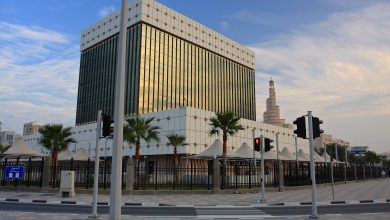
The Imposition of “Selective Taxation” on Health Damaging Goods
فرض “الضريبة الانتقائية” على السلع الضارة بالصحة
Doha: The Ministry of Finance has announced that the general Budget of the State of Qatar for 2019 will achieve a surplus of QR 4.3 billion, according to Budget estimates.
On a consumer level, a ‘Selective Tax’ imposed on health damaging goods. The statement of the Ministry of Finance says:
“The Selective Tax law is designed to impose taxes on certain health-damaging goods and it will be implemented by the beginning of 2019. The law includes a 100% tax on tobacco and its products and energy drinks, and a 50% tax on sugary drinks.”
Other highlights:
Issuing a decision to establish the General Tax Authority
No adjustments in the tax on income of the foreign investors share in companies (by 10% of profits)
The amendments grant further exemptions to key economic sectors
No tax on the income of citizens and residents
No taxes on investments in shares and profits
Imposing selective taxes on health-damaging goods at the beginning of 2019
VAT will not be imposed in 2019 and its effects are being assessed.
A set of taxation laws
A set of taxation laws have been issued today including Law number (24) of 2018 on the Income Tax, Law number (25) of 2018 on the Selective Tax. Also, a decision was issued to establish the General Tax Authority.
The new tax laws are part of the process of developing Qatars financial system to keep up with international best practices and enhance economic growth and financial stability, due to the importance of the taxation system in financial policies in most countries around the world.
The General Tax Authority
The General Tax Authority (GTA) has been established as a separate entity, under the supervision of the Ministry of Finance, and will be in charge of the implementation of all tax laws.
The GTAs mandate includes:
The implementation of all tax laws and setting up all related bylaws, procedures and instructions.
Reviewing and assessing tax return forms submitted by all establishments and the collection of taxes from subject entities.
Representing the State of Qatar in relevant international and regional organizations as well as at international conferences and events.
Signing agreements with other countries regarding the prevention of double taxation to encourage economic cooperation and joint investments.
Income Tax
The Income Tax law of 2018 amends previous income tax laws. The income tax on foreign companies working in Qatar or on the stake of foreign partners in joint ventures remained at the same level, which is a 10% flat rate on profits.
The amendments focused on reforming administrative and procedural systems, supporting tax compliance by taxpayers and granting greater flexibility in granting tax exemptions to institutional activities in key economic sectors and economic zones to support growth and economic diversification, thereby encouraging and attracting foreign investment.
The law stipulates that the salaries and wages of citizens and residents shall not be subject to any tax. It also grants exemptions for equity shares listed on a recognised stock exchange profits of banking deposits and companies working in the agricultural sector and fisheries. Marine and aerial transportation are also exempted under the principal of reciprocity.
source: thepeninsulaqatar.com
الدوحة- قنا:
صدر أمس القانون رقم (24) لسنة 2018 بإصدار قانون الضريبة على الدخل، والقانون رقم (25) لسنة 2018 بشأن الضريبة الانتقائية، كما صدر قرار بإنشاء الهيئة العامة للضرائب.
وتهدف هذه التشريعات إلى تطوير المالية العامة للدولة ومواكبة أفضل الممارسات الدولية في مجال الضرائب بما يدعم النمو الاقتصادي ويحقق الاستقرار المالي، حيث يعتبر النظام الضريبي إحدى الركائز الرئيسية للسياسة المالية في معظم دول العالم.
ويأتي إنشاء الهيئة العامة للضرائب كهيئة تابعة لوزير المالية لتكون الجهة المسؤولة عن تطبيق القوانين الضريبية وتعزيز الامتثال الضريبي.
وتتركز اختصاصات الهيئة فيما يلي: تطبيق القوانين الضريبية ووضع الأنظمة واللوائح والتعليمات ذات العلاقة، ومراجعة وتقييم الإقرارات الضريبية وتحصيل الضرائب من المؤسسات المكلفة، وتمثيل الدولة في المنظمات والهيئات والمؤتمرات الإقليمية والدولية ذات الصلة، وإبرام الاتفاقيات الضريبية مع مختلف دول العالم بما يساهم في زيادة التعاون الاقتصادي وتشجيع الاستثمارات المشتركة.
كما يتضمن قانون الضريبة على الدخل عدة تعديلات على القانون السابق، وقد استمر معدل الضريبة على الشركات الأجنبية العاملة في الدولة أو حصة الشريك الأجنبي كما هو في السابق عند 10% من الدخل الخاضع للضريبة.
وتركزت التعديلات على إصلاح النظم الإدارية والإجرائية ودعم الامتثال الضريبي من جانب المكلفين ومنح المزيد من المرونة فيما يتعلق بمنح الإعفاءات الضريبية لأنشطة المؤسسات في القطاعات الاقتصادية الرئيسية والمناطق الاقتصادية بما يدعم النمو والتنوع الاقتصادي، الأمر الذي يساهم في تشجيع وجذب الاستثمارات الأجنبية.
وينص القانون على عدم إخضاع رواتب وأجور الأفراد من المواطنين والمقيمين لأية ضريبة، ومنح إعفاءات للاستثمارات في الأسهم المدرجة في البورصة وأرباحها، والفوائد والعوائد المصرفية، وقطاعات الزراعة، والصيد البحري كما سيتم إعفاء خدمات الملاحة الجوية والبحرية بشرط المعاملة بالمثل. فيما يهدف قانون الضريبة الانتقائية إلى فرض ضرائب على بعض السلع المنتقاة ومن المقرر تطبيق القانون بداية عام 2019، ويتضمن القانون قائمة بالسلع المستهدفة حيث سيتم فرض ضرائب بنسبة 100% على منتجات التبغ ومشروبات الطاقة، بينما سيتم فرض ضريبة بنسبة 50% على المشروبات الغازية المحلاة.



